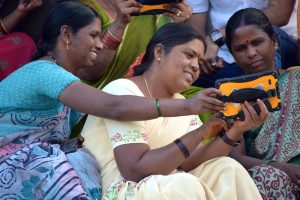Low-cost Technology can Have Life-changing Impacts for Rural Women
 19 Oktober 2020
19 Oktober 2020

Members of a women-farmers’ collective demonstrate use of a devices that sends daily bulletins on weather patterns, crops and other matters of importance to farming communities in rural India. Inexpensive technology can have a life-changing impact on rural women. Credit: Stella Paul/IPS
By Samira Sadeque
UNITED NATIONS, Oct 19 2020 (IPS)
Access to technology which is relatively inexpensive to deploy can have a life-changing impact for rural women, social scientist Valentina Rotondi told IPS.
Rotondi shared her insight during a presentation of her research titled “Digital rural gender divide in Latin America and the Caribbean” to mark International Day of Rural Women on Thursday, Oct. 15.
At the presentation, Rotondi said her team studied the impact of the digital gender gap and access to technology on women’s health. Their research focused specifically on access to reproductive and sexual health for women in sub-Saharan Africa.
“Access to mobile phones can be a vehicle for improving health and reproductive health for women living in those remote areas,” Rotondi told IPS. “Women living in remote areas can get access to information regarding their pregnancy or their health. As a result, getting access to this information and reducing their travel time to hospital, improves the health status of their babies.”
The research was carried out by the University of Oxford, and the webinar was co-organised by the Inter-American Institute for Cooperation on Agriculture (IICA), the Inter-American Development Bank and the International Fund for Agricultural Development.
Manuel Otero, Director General of IICA, said in his opening remarks that the observation of International Day of Rural Women was to celebrate the far-reaching “direct implications” and “deep roots” that rural women hold in the lives of those around them.
“Women in rural territories deserve and need to be applauded, because they are the ones that guarantee rootedness, and are also at the core of family and productive life,” he said.
Otero added that rural women played a key role in ensuring food security and, ultimately, the whole purpose of agricultural development and rural wellbeing.
And yet, often they remain invisible in larger society.
Calling them the “guardians of our rural territories”, Otero said that last week’s celebrations were a part of the framework to gain recognition for such a vital section of society.
“We want to encourage public discussion which is necessary in order to push for development and implementation of high quality policies that would, once and for all, improve the situation for the women who live out in the countryside,” he said.
At the talk, Rotondi added that while it is very low-cost to implement the kind of technological access that provides women with information about reproductive health, their impacts can be life-changing.
“The impact of those kinds of technology, which are really cheap and [help] connect [the women] to others, are big enough and could really be a vehicle for sustainable development,” she said.
According to their research, narrowing gender gaps in mobile phone adoption can further narrow gender gaps in internet access, which might be “pivotal” in terms of health of improvement.
Rotondi further cited research that found access to mobile phones can improve women’s financial resilience , which in turn improves their outcomes.
She shared the findings of their study that support this analysis:
- Women living in rural areas are the least “connected” group.
- The digital gender divide, which hampers women’s ability to access information and communication technologies, was narrowing in Latin America and the Caribbean until a few years ago
- In 17 of the 23 countries analysed, women are less likely than men to report owning a mobile phone
- Countries that report a narrow digital gender gap also have lower gender gaps in vulnerable employment, youth unemployment and labor-force participation
The digital divide between men and women has been further impacted by the coronavirus pandemic.
“In this pandemic situation, whereby schools are closed, people who have access to mobile phones and the Internet might be able to continue education, but those without this technology cannot,” Rotondi added.
Otero of IICA added that the current pandemic has made it more challenging for the rural women who are even less connected, highlighting the invisibility of rural women and their work.
“It’s not enough to talk about access to land ownership, productive resources, finances, education, training, health, and justice” he said. “In particular, we [must] focus on the issue of connectivity. The pandemic has shown us that [having a] cell phone opens up almost every type of possibility, the ability to study, to sell or to buy – and therefore to work.”
The post Low-cost Technology can Have Life-changing Impacts for Rural Women appeared first on Inter Press Service.
